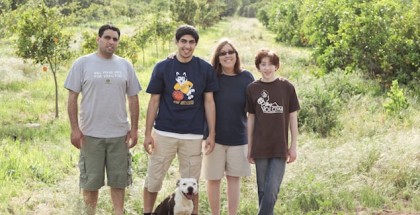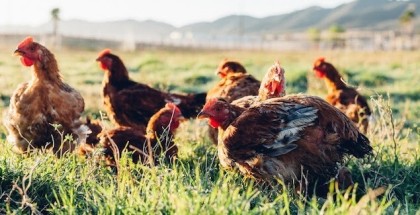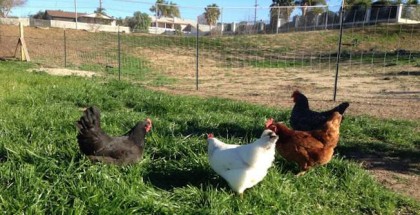local food systems
For Riverside, CA Food Co-op ‘Local is Micro-local’
May 31, 2016 | AJ Hughes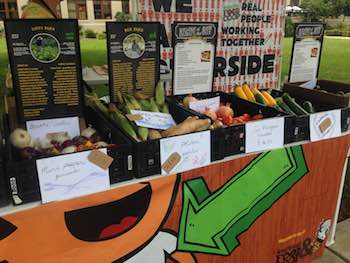
Al Centro mini produce stand, operated by the Riverside Food Co-op, provides locally-grown fruits and vegetables to Riverside residents. (photo courtesy Alannah Leblanc/Riverside Food Co-op)
The most important word for the Riverside Food Co-op (RFC) is “local.” Its definition can be broad, but for Nick Melquiades, RFC core team operations manager, “local” has a very specific meaning.
“For us, local is micro-local,” Melquiades says. “Ninety-five percent of our produce comes from within 25 miles of downtown Riverside.”
The RFC formed in 2011 in response to the recession in Riverside, has eventual plans to open a store. Not having a physical retail location to sell local produce, however, has not prevented it from playing an outsize role in local food system development in the City of Riverside. Read More
On Land Once Owned by University of California, Riverside, UCR Student Launches Avocado and Citrus Venture
May 19, 2016 | Anne Meyer Byler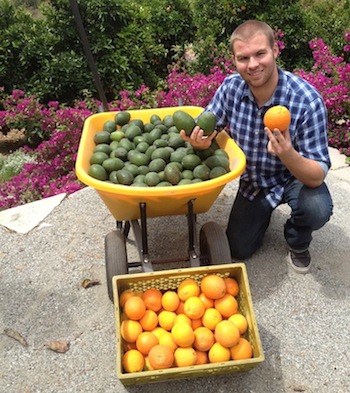
MIchael Johnson of Coronet Corner Grove in Riverside, CA with avocados and citrus that he grows and sells at the local farmers market, to the Riverside Food Co-op and through other local outlets. (Photo courtesy of Michael Johnson).
On agricultural land once used by the University of California, Riverside (UCR) for the development of the hybrid Gwen Avocado, Michael Johnson, a student who coincidentally happens to be attending UCR, has launched a burgeoning local food and farming venture.
Johnson has since rechristened the two acre plot of land, which his father purchased from UCR in 1995 as ‘Coronet Corner Grove.’
As a kid, he grew up working and playing on the farm land to which his father added oranges, grapefruits, lemons, limes, kumquats and loquats to complement the avocados already growing there.
The farm slowly became a part of him and in 2012, when he was just 18, Johnson saw an opportunity to take advantage of the growing demand for local produce and create an economically viable farming enterprise. So, he launched ‘Coronet Corner Grove’ and began handing out business cards and selling his produce at the Riverside Certified Farmers’ Market. Read More
Despite Current Dysfunction in the Food System, Renowned Agroecology Expert Holds Out Hope for Future
May 10, 2016 | AJ Hughes
Stephen R. Gliessman, Alfred E. Heller Professor of Agroecology in UC Santa Cruz’s Environmental Studies Department, shares his thoughts regarding the state of the food system. Photo courtesy University of California, Santa Cruz
What is the state of the nation’s food system? Is it fundamentally broken and beyond repair? Does it need to be changed, and if so, how? What is it doing right?
To address these questions, we reached out to Stephen R. Gliessman, an internationally recognized leader in the field of agroecology, and the Alfred E. Heller Professor of Agroecology in UC Santa Cruz’s Environmental Studies Department, where he has taught since 1981. He was the founding director of the UCSC Agroecology Program (now the Center for Agroecology and Sustainable Food Systems) and is the author of the renowned and pioneering textbook Agroecology: The Ecology of Sustainable Food Systems. In 2008, Gliessman became the chief editor of the internationally known Journal of Sustainable Agriculture.
Here is what we learned:
What is the state of the food system?
The current state of the food system is unhealthy. There is too much emphasis put on the business of growing food rather than long-term stewardship, care for the earth, and the people who grow food. That, I think, is a more important part of what’s going on. It’s amazing what the current food system is able to produce in terms of calories, but it’s also amazing in terms of what it doesn’t produce in terms of healthy nutritious food. Read More
Former Dude Ranch Near Lake Elsinore Finds Success as Sustainable Pastured Lamb and Poultry Farm
April 28, 2016 | AJ Hughes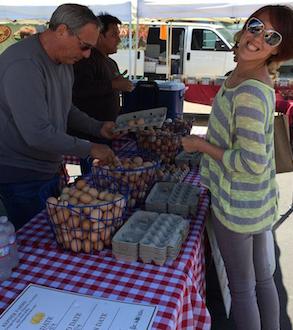
Kepner Farms sells eggs at the Manhattan Beach farmers’ market. (photo courtesy Carl Kepner/Kepner Farms)
Near Lake Elsinore, California, a former dude ranch is now home to pastured lamb and poultry.
Its transformation began when Carl Kepner inherited the land in 2010 and began Kepner Farms. It took some trial and error, however, for the business to arrive at its current incarnation.
Kepner started with aquaponics, and by 2012 was selling agricultural products. But he did not like the overall performance he was getting through his aquaponics operation, and switched over to traditional planting.
“I like soil better,” he says.
But realizing that growing fruits and vegetables was too labor-intensive for his liking and wanting to make permaculture a central theme of his operation, Kepner decided to raise pastured lambs and chickens. Now, Kepner Farms features 2,000 chickens and 250 head of sheep and lambs. Read More
Diversification, Organic Growing, and Savvy Enable Riverside Family to Save Farm and Prosper
April 20, 2016 | AJ Hughes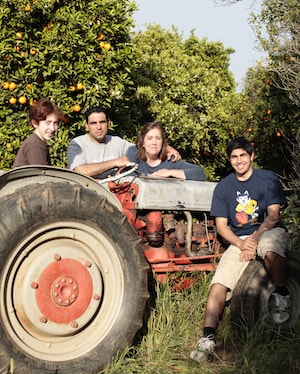
Hassan and Deborah Ghamlouch, along with their two sons, Zachary and Jacob, run The Grove, an organic family farm in Riverside, CA. (photo courtesy Hassan Ghamlouch/The Grove)
The Grove, a diversified and certified-organic family farm in Riverside, CA used to grow only citrus fruit and avocados. But in order to survive a changing market, it has diversified to include a wide array of organic produce.
Hassan Ghamlouch and his wife, Deborah, have operated The Grove for more than 13 years. Their sons Zachary and Jacob are also key contributors to the operation.
The farm has been in the family for four generations, dating back to the late nineteenth century when it primarily produced navel oranges. When Deborah’s parents wanted to sell the farm in the early 2000s, she and Hassan decided to purchase it and take over. They based their decision partly on the fact that The Grove’s orange trees are part of the original rootstock planted well over 100 years ago.
But Hassan and Deborah knew that if they wanted to keep the farm in their family, drastic changes were inevitable and necessary. Read More
Pasture-raised Livestock Operation in Murrieta, CA Finds Success by Getting People to the Farm
April 12, 2016 | AJ Hughes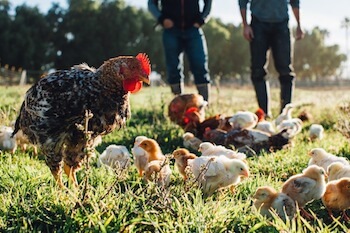
Murrieta, CA-based Primal Pastures is a family farm that sells pasture raised chicken, pork, lamb, beef, honey, and wild seafood. (Photo Credit: Kathi Bahr)
“We’re trying to take farming practices back 100 years, but put the business model 10 years ahead,” says farmer Paul Greive of Murrieta, CA-based Primal Pastures.
Greive and three of his in-laws founded Primal Pastures in 2012, starting with pastured free-range chickens. The small family farm has since expanded its offering and, in addition to poultry, now sells pasture raised pork, lamb, beef, honey, and wild seafood to its customers.
Primal Pastures is not an organic farm, but Greive takes pride in the fact that he and his fellow farmers employ regenerative and environmentally responsible farming practices that “go beyond sustainability.” Read More
‘Beyond Organic’ Farm Emerges in Riverside’s Glen Valley to Seize Upon Local Food Opportunity
April 8, 2016 | AJ Hughes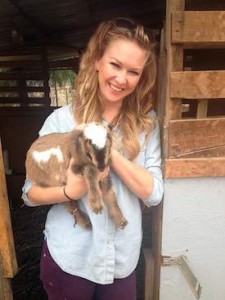
Kayla Causey is operator and owner of Sunny Cabana Farms in Riverside, CA where she raises goats and chickens. (photo courtesy Kayla Causey/Sunny Cabana Farms)
The story of Sunny Cabana Farms began when Cal State Fullerton lecturer Kayla Causey and her husband decided that they wanted more elbow room than their Orange County suburb could provide. So, in 2014 they moved to Riverside’s spacious Glen Valley area and began to lay the groundwork for a farm that would provide locally produced food and value added products to area residents.
Five chickens who already lived on the two-acre plot gave Causey a head start. Since then, Causey’s added dairy goats and Kunekune pigs (a heritage breed) as well as more chickens. An onsite orchard produces oranges, lemons, pomegranates, pears, grapefruit and apricots. Currently Causey milks seven dairy goats, which provide milk and kefir for her family. From the goat milk she also makes cheese and a variety of soaps and lotions.
Sunny Cabana Farms sells several of these items, but since it’s not a licensed grade A dairy, its milk and cheeses can’t legally be sold for human consumption. Read More
6 Simple Ways To Support Local Food And Farmers
March 10, 2016 | Davina van Buren
Kevin Prather of Mellowfields Urban Farm and Common Ground urban farm, sells his produce at the Cottins Hardware Farmers Market. Image credit: Eileen Horn
Whether you are new to the local food scene, or you’ve been buying from your neighborhood farmers market for years, you’re making a big difference in the lives of small farmers and food distributors. But the food system is complicated. It’s not always clear how to spend your resources—whether to invest time or money—to best support your local food system.
So we’ve compiled six tips to make it even easier for you to support local food producers. Read More


